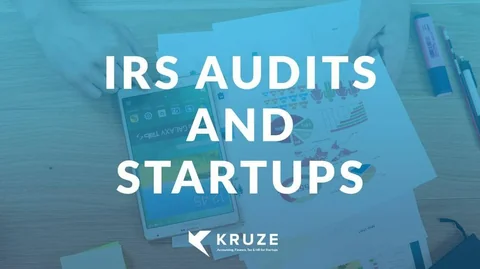
Video: What Can I Do to Make Sure That My Startup is Well Prepared for an IRS Audit?
What can I do to make sure that I am prepared for an IRS audit? Ultimately, how can I make sure that I don’t get it to an IRS audit situation?
The answer is there are four main things that you really want to keep in mind.
- Save receipts over $75
- Unprofitable startups are less likely to be audited
- Keep payments to execs well documented and appropriate
- R&D tax credits are a leading reason unprofitable startups get an IRS audit - use a quality provider
The first of which is to make sure that you save all of your receipts for anything over $75. Also, make sure that you keep all of those business expenses reasonable. Things like purchases from Office Depot, that is plain and simple, pretty clearly a business expense but something from Lululemon, that does not sound like a business expense whatsoever. Just make sure that you do keep it in the realm of business and in your specific business line.
The second thing to keep in mind is whether or not you’re profitable. One of the first things that the IRS is going to look for when selecting who to audit is whether or not you’re a profitable company and whether or not it’s going to be worth their time to go in, send an agent, and really poke through all of your files. If you’re a pre-revenue startup or if your operating at a loss chances are you’re not going to be flagged for an IRS audit but that is not a hard fast. There is one exception, which we will address in point four.
The third thing that you’re going to want to keep in mind is payments to the executive team. IRS auditors care about this a lot. They do want to make sure that if you have had money going out to the executive team that it’s either gone through payroll or it’s for legitimate business expense reimbursements. This is where using Expensify really comes into play. You absolutely want to make that if you are reimbursing any employee in your company or contractor for that matter, that you’re using Expensify largely because it provides a rock-solid audit trail should those auditors come up and ask about certain transactions.
The fourth item to be very, very focused on is if you are using any tax credits. This is especially true if you are an unprofitable startup using the R&D tax credit. This tax credit gets you actual $$ from the US Treasury - even if you are unprofitable. When you take money from the government, the IRS is way more likely to get interested. That’s why we ALWAYS recommend that startups use quality, startup-focused CPAs to prepare their R&D tax credit studies. We believe that R&D tax credits are the number 1 reason an unprofitable startup would be audited by the IRS. Our tax team has successfully made it through IRS audits, and we keep abreast of best practices to help make sure our startup clients are ready.
Again, in order to make sure that you are ready for an IRS audit and you stay out of trouble, save your receipts over $75, consider whether or not you’re at risk for an audit if you’re a profitable company, make sure you have rock-solid documentation on payments to the executive team, and use high-quality CPAs for your tax credit work.
Finally, if you were looking for information on audits for startups by accounting firms (i.e. when your investors ask for an audit to confirm the quality of your financial statements and reporting), visit our startups audits page to learn about what we recommend.








